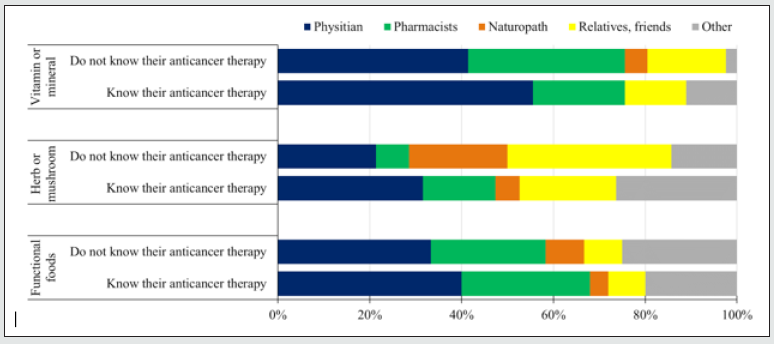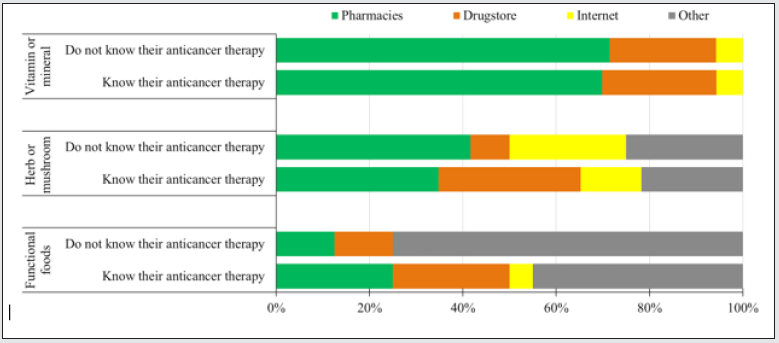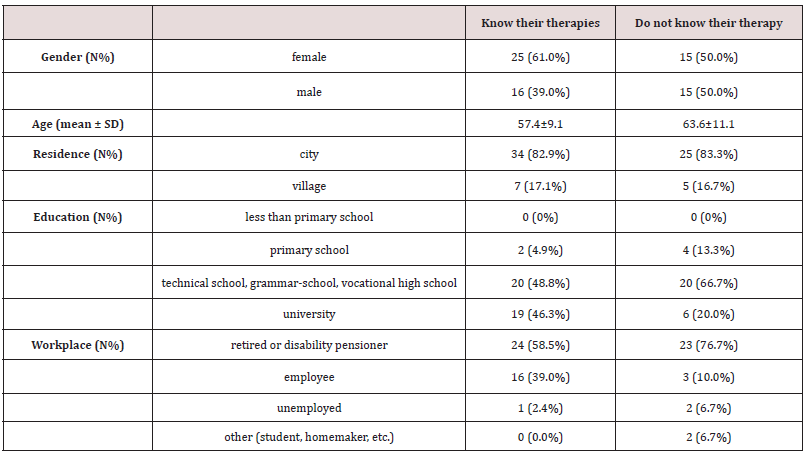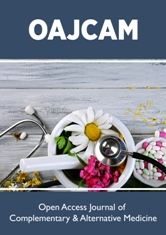
Lupine Publishers Group
Lupine Publishers
Menu
ISSN: 2644-1217
Research ArticleOpen Access
Complementary Medicine in Cancer Patients in The View of Health Literacy Volume 3 - Issue 2
Dénes Kleiner1,2, Hegyi Gabriella3*, István Horváth1, Mária Matuz4, Magdolna Dank2 and Balázs Hankó1
1Department of Pharmacy Administration, Semmelweis University, Hungary
2Semmelweis University Oncology Center, Hungary
3Health Science Dept., Pecs University, Pecs, Hungary
4Department of Clinical Pharmacy, University of Szeged, Hungary
Received:June 02, 2021 Published: June 25, 2021
*Corresponding author: Hegyi Gabriella, Pecs University, CAM Department, Doctoral School, Hungary
DOI: 10.32474/OAJCAM.2021.03.000156
Abstract
While nowadays anticancer therapies had gone through fundamental changes, health care providers must pay attention to the emerging utilization of dietary supplements, functional foods and further complementary and alternative therapies. The appropriate health literacy is a key element in the management of cancer patients’ life too, so it has worthwhile implication in the questions of complementary and anternative therapies. Hence, we wanted to measure the food supplements, functional foods and such agent’s utilization and basic knowledge about them in the Semmelweis University Oncology Center. To our questionnaire 71 patients answered. Due to their knowledge about their antitumor therapies, we divided participants to two groups (N=41 for those, who know their therapies; N=30 for those, who do not know it). However, only 43.9% of those, who know their therapies were precise about it, but grouping was not modified by this data. Tendentious differences were seen between the two groups in the vitamin and/or mineral containing food supplements, herb and/or mushroom containing food supplements, functional foods, special diets, utilization of homeopathy, but significantly more people tried deuterium depleted water in the group of those, who know their therapies. All in all, the type of food supplements etc. seems to be a more prominent factor where from the patient heard about it, in the further sources of information, and in the procurement. Still, health care professionals have a significant role in the good patient education and health literacy, because patients better ask their physician about these products while they mainly purchase them in pharmacies, hence pharmacists have a noteworthy role in the revision of harmful therapies.
Keywords: Oncology; Dietary Supplements; Complementary Medicine; Health Literacy
Introduction
While new and more sophisticated therapies emerged in the treatment of cancer, it should not be forgotten, that the use of complementary and alternative therapies are also increasing. Buckner et al (2018) also studied, why people choose these products. Mainly people try every option to help in themselves, but the real spectrum of the reasons can be much more widespread. All in all, it can be problematic, because some of these agents can cause interactions, while the utilization of such therapies may cause loss of trust in the doctor-patient relationship [1,2]. It is also wellknown, that even supplements are in the category of foods. Hence their effects are not comparable with drugs against cancers [3]. On the other hand, their effects should not be underestimated, as they can be supportive agents in the treatment of a tumor – as well as they can cause life-threating interactions [4].
While the management of life by a patient is an element of health literacy, it seems necessary to improve health literacy of cancer patients [5,6]. This theory has been already proven by Cartwright et al. (2017), as they found negative correlation between health literacy and hospitalizations [7]. Not to mention, there has been present literature about the development of health literacy at cancer patients [8]. For that, in our work we wanted to characterize the health literacy of the Oncology Center of Semmelweis University’s patients about the utilized food supplements, and functional foods, then describe intervention points.
Materials And Methods
Study Design
The study was conducted as guided interviews in the Oncology Center of Semmelweis University (Tömő utca 25-29, Budapest, H-1083, Hungary). Our questionnaire concerned with demographic data, dietary supplements and functional foods. In the study we asked some well-known facts about food supplements. These questions were concerned with safety requirements (if there is any difference between food supplements vs. medical products); differences between manufacturers; the importance of informing someone’s physician about the consumed products; and the risks of food supplement in the light of chemotherapy (or other therpaies). From these data we made a cumulative number, named as “knowledge-point” (maximum = 4 points).
In the questionnaire, to clarify for the patients, an appropriate definition was also given for the above mentioned categories of foods. Furthermore, we asked about the illness, the antitumor therapy and therapies or diets that were not prescribed in the institute. Some pharmaceutical quality products (for instance vitamin C tablets, magnesium tablets) were utilized without a physician’s advice, hence we could not distinguish between some over the counter drugs and food supplements or same products (like foods for special medical purposes), as it was also noticed in the literature [9,10].
Participation in the study was optional and anonymous. The survey was in accordance with the Declaration of Helsinki, approved by the Health Science Council, Scientific and Research Ethics Committee [ETT-TUKEB (Egészségügyi Tudományos Tanács, Tudományos és Kutatásetikai Bizottság) approval number: 31/2016].
Statistical Analysis
Statistical analysis was carried out with Microsoft Excel 2013 (Microsoft Corp., Redmond, USA) and R (R Foundation for Statistical Computing; Austria).
Results
Demographic parameters are shown in (Table 1). It should be mentioned that the survey was mainly conducted in the older generation, but younger patients were also answered to the questions. The youngest patient was 31-year-old women with breast cancer. Most participants lived in cities (83.1%). Patients mainly had higher education. As it can be seen in Table 1. 56.3% had technical school, grammar school or vocational high school education, while 35.2% had a diploma from a university. Rest of the participants had primary school education, no one fulfilled less than primary school. The majority of participants were disability pensioner or retired (66.2%), but more than quartel of the patients were employee (26.8%).
As in the question of interactions the current therapies have to be observed, it has been asked from the patients. Mainly people said, they knew their therapies with or without help (41 people; 57.7%), but relevant number of them had no idea about their therapy (30 people; 42.3%). It should be mentioned that significantly more participants from the younger generation knew its therapy. Furthermore, therapies were supervised. Sadly, less than half of the participants (43.9%) know their therapies accurately.
Almost all participants used some kind of vitamin or mineral containing supplement, only two people have not used these kinds of agents. They were from the group of those, who do not know their therapies have not used. In the pattern of where people heard about the vitamin and mineral containing supplement there was no relevant difference, but it is an intriguing difference in the sources of further information between those who knew their therapies. While Figure 1 shows the percentage of every answers, more than 1 answer were acceptable. All in all, 14 from 28 people who do not know their therapies would better use internet, or ask their pharmacist, versus those who knew their therapies. Only 36.6% and 22.0% would use these sources for further information. Furthermore, two more people would ask their naturopath for such information in the group of those, who do not know their therapies. At the questions about vitamin and mineral containing food supplements strangely those, who knew their therapies had slightly less knowledge points (2.97 points) than those, who do not know it (3.03) (Figure 2).
Figure 1: The source of further information about a product The figure shows if a patient needs further data about a product. Numbers are represented in the percentage of every answers.

Figure 2: Procurement of a food supplements and functional foods. The figure shows the places where pateints purchased the utilized product. Numbers are represented in the percentage of every answers.

Less people (N=24) answered to the questions about herbs and/or mushroom containing products, but some differences should be highlighted. For herb and mushroom containing food supplements the pattern of answers seems different not only between the two patient groups, but also in the content of food supplement. For instance, in the first question, we asked whom they heard about the therapies. At those people, who know their antitumor therapies, the most important sources were the internet and other advertisements, the second were physicians, pharmacists etc. and the third most important sources were relatives and friends. In the group of people, who do not know their anticancer therapies, the first most important sources were relatives and friends and the second most important were the internet and other advertisements. It should be noticed, that at the question, where these people heard about these herbs and/or mushroom containing products, physician, pharmacist, etc. as well as naturopaths were mentioned only as third most important sources (22%). In the sources of further information, the internet (in the subgroup of others) was the main tool. In the group of people, who do not know their anticancer therapies relatives and friends were also the main sources of information, but in the other group it seems less relevant, while a physician’s advice was prioritized. In these kinds of food supplements pharmacies were the main place where people (in every group) purchased them. An intriguing tendence was seen in the knowledge-points between the group of people who know their antitumor therapies vs, those who do not know it. The mean knowledge-point was almost 15% less in those participants, who do not know their therapies.
Even less people were answered to the questions about functional foods (N=22). People heard about these foods mainly from the internet or other advertisements, but in the group of people, who do not know their anticancer therapies physicians and pharmacists had the same result. If further information would be necessary, people would ask mainly from their physicians, but the second most common sources were pharmacists in the group of people, who now their therapies as well as at those, who do not know Relevant difference from the upper mentioned food supplements is where people purchase them. As these foods are visibly foods, the two groups of participants bought them in food marts.
We asked about further treatments, like diets or nonprescribed medications. From the 41 participants, who know their therapies, 11 utilized some kind of diets. From the 30 people, who do not know their therapies, also 11 utilized some kind of diet. We asked also about homeopathy. Marginal number of participants (N=5) used these medicines, but all of them was in the group of those, who know their anticancer therapies. From these 5 people 2 utilized it because of the cancer, but these two patients also thought that someone should not cease their therapies because of homeopathy, or the utilization of food supplements. All in all, only one, 54-year-old, male participant believed, that he may stop its current therapies (i.e., not only anticancer therapy), because of the utilization of food supplements and/or homeopathy. We also asked about the utilization of deuterium depleted water. Only 7 patients utilized it from the group of participants, who know their therapies, which was significant (p<0,05) by Fisher’s exact test.
Despite of the questions about the supplements, we further asked from people, whether herb or mushroom containing supplements can influence their therapies. In the group of participants, who know their therapies 51.2% thought it may affect their therapies, but these interactions mainly not do serious harm. Twenty-two percent of them thought, that these interactions can cause serious harm, but 26.8% believed, that these products are safe. In the cases of those participants, who do not know their therapies, 46.7% thought, these agents may affect their therapies, but these interactions mainly not do serious harm, 16.7% thought, these interactions can cause serious harm and 36.7% believed that these products are safe.
Discussion
As health literacy raises relevant questions in the whole healthcare systems, the oncology-related health literacy should be also revised and developed, with special attention to complementary and alternative medicines. For that, we wanted to describe the Oncology Center of Semmelweis University’s healthy literature about the utilized food supplements, functional foods, diets and other, non-prescribed therapies in the view of their knowledge about their own antitumor medication.
Limiting factor of our work is the relatively low number of participants, hence statistical analysis may not as punctual. It should be also mentioned that only one cancer center was in the study. On the other hand, as Table 1 shows, the Oncology Center of Semmelweis University provides not only the capital city.
We assessed our data by grouping it to those, who know their therapies and those, who do not know it. Sadly, those, who know their antitumor therapies were also imprecise, and only 43% know it well. On the other hand, we have not seen numerous significant differences between groups. Significantly more younger people know their therapies, which seem to be in good accordance with the well-known history and development of physician-patient relationship [11]. Another significant difference is that those who know their therapies more likely utilized deuterium depleted water. For now, there are clinical trials assessing this complementary agent in therapies, but clinical and preclinical results seem promising [12,13]. On the other hand, it is not clear, why were more utilized at these participants. It is a noteworthy concept, that those, who better know their therapies may try to find more way to help on themselves – while the concept was not really supported by the other complementary therapies (but the small numbers may bias the results).
In the last decades, internet become a main source of information, as well as a main point, where people can purchase products [14]. Even so, physicians are the most important sources of information, and pharmacies are the most important places to purchase these products. Two exceptions should be highlighted: in the group of those, who do not know their therapies, the main source of information was relatives and family members at the herb and/or mushroom containing products; and functional foods were mainly purchased from food marts. In the second highlighted case it should be mentioned that these products seem to be foods, and easy to mix with normal foods.
On the other hand, physicians have a noteworthy opportunity to inform patients about food supplements or functional foods, etc. regardless of how patients know their therapies. This can be crucial in the case of herb or mushroom containing products because these agents’ interaction spectrum is less studied than vitamin or mineral containing supplements. However patient education is not the duty of only the physicians, and the literature has many examples that they may need help in this work [15, 16]. The alteration in the education of pharmacists and other healthcare specialists are reliable opportunities in these questions, as pharmaceutical training for example contains lectures about herbs and mushrooms.
Another intervention points are the pharmacies. They are one of the last healthcare specialists before the patient may use a product. It seems an important point to check the food supplements and such products. Also it can be necessary for the patient to know their therapies – which means, 42.3% of the participants posed to some kind of pharmaceutical risk, and a further 43.9% had a minor risk, as they know some information about their therapies. While questioning a patient can lengthen the dispensing, pharmacists may provide better information to patients than other places [17].
All in all, food supplements, functional foods, special diets, etc. are common in the complementary and alternative therapies of patients in an oncology center. While these products and products are easily available, health care professionals have to describe intervention points and find tools to inform patients about the risks and benefits.
Conflict of Interest:
The authors declare that they have no conflict of interest.
Funding
We would like to thank for the ”Together for the Local Communities” application, provided by Hungaropharma Zrt.
Acknowledgement
We would like to thank Hungaropharma Zrt. for its support in the “Together for Local Communities” application and to dr. Dorina Ali, dr. Szonja Bóta dr. Diána Simon for the help at the questionnaires. Dietary supplements and supplemented diets
References
- Buckner CA, Lafrenie RM, Dénommée JA, JM Caswell, DA Want et al, (2018) Complementary and alternative medicine use in patients before and after a cancer diagnosis. Curr Oncol, 25(4): e275-e281.
- Zörgő S, Olivas Hernández OL (2018) Patient journeys of nonintegration in Hungary: A qualitative study of possible reasons for considering medical modalities as mutually exclusive. Integr Cancer Ther 17(4): 1270-1284.
- https://www.ogyei.gov.hu/etrend_kiegeszitok [accessed: feb 16, 2021]
- Fasinu PS, Rapp GK (2019) Herbal Interaction with Chemotherapeutic Drugs—A Focus on Clinically Significant Findings. Front Oncol 9: 1356.
- Liu C, Wang D, Liu C, Junnan Jiang, Xuemei Wang, et al. (2020) What is the meaning of health literacy? A systematic review and qualitative synthesis. Fam Med Community Health 8(2): e000351.
- Housten AJ, Gunn CM, Paasche-Orlow MK, et Basen-Engquist KM (2021) Health Literacy Interventions in Cancer: a Systematic Review, J Cancer Educ 36(2): 240-252.
- Cartwright LA, Dumenci L, Cassel JB, Maria D Thomson, Robin K Matsuyama et al. (2017) Health Literacy Is an Independent Predictor of Cancer Patients' Hospitalizations. Health Lit Res Pract, 1(4): e153-e162.
- Sørensen K, Makaroff LE, Myers L, Paul Robinson, Geoffrey J Henning, et al. (2020) The call for a strategic framework to improve cancer literacy in Europe. Arch Public Health, 78: 60.
- Fittler A, Bősze G, Botz Lajos (2010) Attitude of patients and customers regarding online drug purchase – a Hungarian community pharmacy survey. [Internetes gyógyszervásárlás megítélése a gyógyszertárba járó fogyasztók, betegek köré] Orv Hetil 151(48): 1983-1990. [Hungarian]
- Végh A, Lankó E, Fittler A, Vida Róbert György, Miseta Ildikó et al, (2014) Identification and evaluation of drug-supplement interactions in Hungarian hospital patients. Int J Clin Pharm 36(2): 451-459.
- Murgic L, Hébert PC, Sovic S, Pavlekovic G (2015) Paternalism and autonomy: views of patients and providers in a transitional (post-communist) country. BMC Med Ethics 16(1): 65.
- https://www.clinicaltrialsregister.eu/ctr-search/trial/2015-003820-30/SK [accessed: May 31, 2021]
- Boros LG, D'Agostino DP, Katz HE, Justine P Roth, Emmanuelle J Meuillet et al, (2016) Submolecular regulation of cell transformation by deuterium depleting water exchange reactions in the tricarboxylic acid substrate cycle. Med Hypotheses 87: 69-74.
- Fittler A, Vida RGy, Káplár M, Lajos Botz (2018) Consumers turning to the internet pharmacy market: Cross-sectional study on the frequency and attitudes of Hungarian patients purchasing medications online. J Med Internet Res 20(8): e11115.
- Davis EL, Oh B, Butow PN, Barbara A Mullan, Stephen Clarke et al. (2012) Cancer patient disclosure and patient-doctor communication of complementary and alternative medicine use: a systematic review. Oncologist 17(11): 1475-1481.
- Shelley BM, Sussman AL, Williams RL, Alissa R Segal, Benjamin F Crabtree et al. (2009) 'They don't ask me, so I don't tell them': patient-clinician communication about traditional, complementary, and alternative medicine. Ann Fam Med 7(2): 139-147.
- Coon SA, Stevens VW, Brown JE, Mark J Wrobel, Stephen E Wolff et al, (2015) Comparison of dietary supplement product knowledge and confidence between pharmacists and health food store employees. J Am Pharm Assoc (2003) 55(2): 161-168.

Top Editors
-

Mark E Smith
Bio chemistry
University of Texas Medical Branch, USA -

Lawrence A Presley
Department of Criminal Justice
Liberty University, USA -

Thomas W Miller
Department of Psychiatry
University of Kentucky, USA -

Gjumrakch Aliev
Department of Medicine
Gally International Biomedical Research & Consulting LLC, USA -

Christopher Bryant
Department of Urbanisation and Agricultural
Montreal university, USA -

Robert William Frare
Oral & Maxillofacial Pathology
New York University, USA -

Rudolph Modesto Navari
Gastroenterology and Hepatology
University of Alabama, UK -

Andrew Hague
Department of Medicine
Universities of Bradford, UK -

George Gregory Buttigieg
Maltese College of Obstetrics and Gynaecology, Europe -

Chen-Hsiung Yeh
Oncology
Circulogene Theranostics, England -
.png)
Emilio Bucio-Carrillo
Radiation Chemistry
National University of Mexico, USA -
.jpg)
Casey J Grenier
Analytical Chemistry
Wentworth Institute of Technology, USA -
Hany Atalah
Minimally Invasive Surgery
Mercer University school of Medicine, USA -

Abu-Hussein Muhamad
Pediatric Dentistry
University of Athens , Greece

The annual scholar awards from Lupine Publishers honor a selected number Read More...





